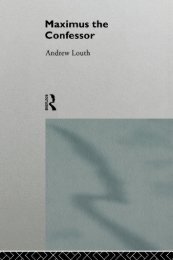Gospels of Thomas and Philip and Truth - Syriac Christian Church
Gospels of Thomas and Philip and Truth - Syriac Christian Church
Gospels of Thomas and Philip and Truth - Syriac Christian Church
Create successful ePaper yourself
Turn your PDF publications into a flip-book with our unique Google optimized e-Paper software.
Establishment— whether political, military or religious— for the sake <strong>of</strong><br />
the truth. Much <strong>of</strong> the present edition was prepared while I was a guest<br />
<strong>of</strong> numerous universities both state <strong>and</strong> private, as well as seminaries<br />
<strong>and</strong> religious communities both Catholic <strong>and</strong> Protestant, thruout Latin<br />
America; <strong>and</strong> also <strong>of</strong> the faculties <strong>of</strong> philosophy, <strong>of</strong> orthodox theology <strong>and</strong><br />
<strong>of</strong> informatics at the University <strong>of</strong> Athens— for their fraternal hospitality I<br />
am pr<strong>of</strong>oundly grateful. Internet technical advice has been kindly<br />
provided by Ioannis Georgiadis <strong>of</strong> the Athens University Computer Center.<br />
The canonical <strong>Gospels</strong> must be the paradigm in assessing any newly-<br />
discovered ‘Gospel’. That is to say, our criteria for evaluating such a text<br />
must be both its internal consistency with, <strong>and</strong> its external provenance<br />
relative to, the four texts which provide the ostensive definition 1 <strong>of</strong> the<br />
very term ‘Gospel’ to begin with. So: are <strong>Thomas</strong>, <strong>Philip</strong> <strong>and</strong> Valentine<br />
theologically harmonious with the Synoptics <strong>and</strong> John? Do they all come<br />
from the same general historic context <strong>and</strong> archeological ambiance in<br />
antiquity? Are the new texts, upon analysis, both conceptually <strong>and</strong><br />
empirically coherent with the four canonical <strong>Gospels</strong>? Do they, all in all,<br />
seem to be <strong>of</strong> the same Logos? Sufficiently careful scrutiny, I have<br />
concluded, yields an affirmative answer to all <strong>of</strong> these questions. Thus the<br />
intent <strong>of</strong> this present edition, together with the online Coptic texts,<br />
dictionary <strong>and</strong> grammar, is to provide the reader with the resources to<br />
carry out a thorough assessment <strong>of</strong> these extraordinary scriptures for<br />
him/herself.<br />
It has <strong>of</strong>ten been suggested that these new writings are basically<br />
concoctions produced by a series <strong>of</strong> unknown somebodies long after the<br />
events they purport to concern. However, the simplest explanation here<br />
(by William <strong>of</strong> Ockham's famous Principle <strong>of</strong> Economy: ‘Entities should not<br />
be multiplied unnecessarily’) is not lengthy oral tradition followed by<br />
numerous written redactions; the simplest explanation is that these three<br />
scriptures were composed by the Apostle <strong>Thomas</strong>, <strong>Philip</strong> the Evangelist<br />
1 ‘Ostensive definition’: defining a term by indicating an exemplary or paradigmatic referent.<br />
9




